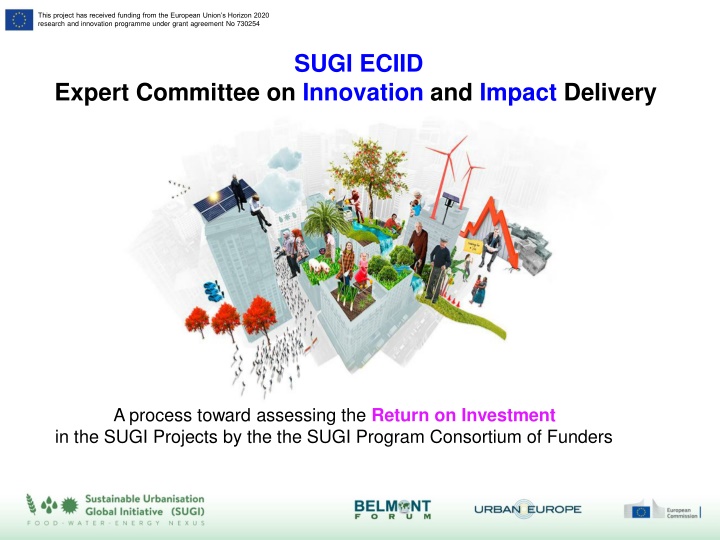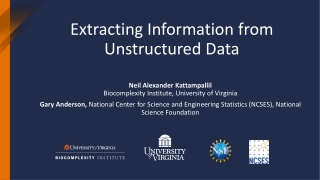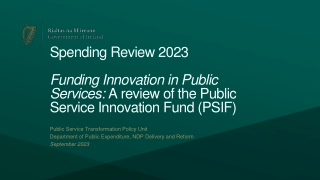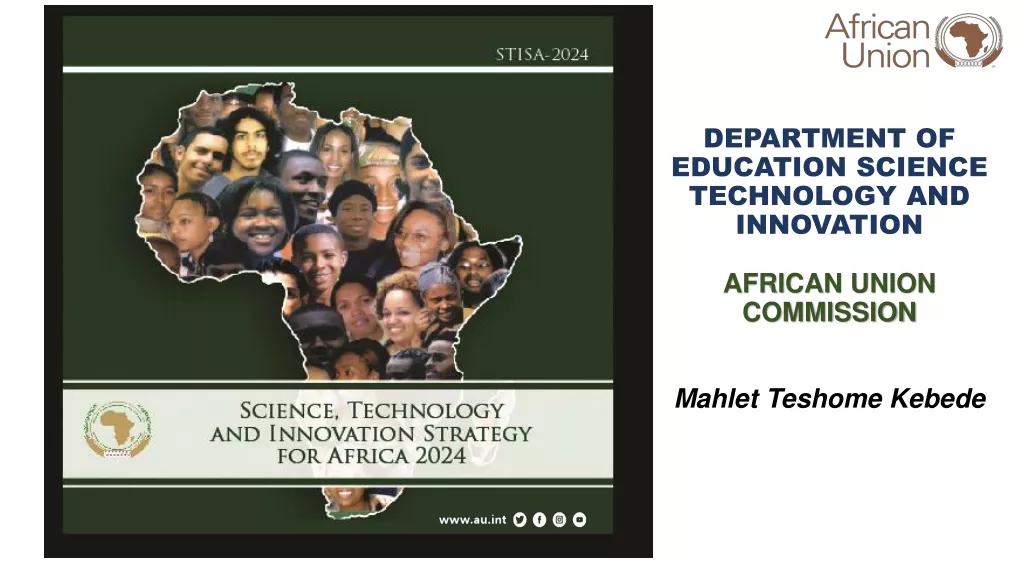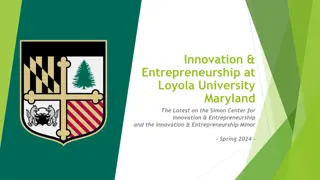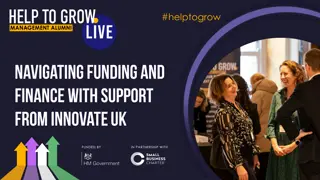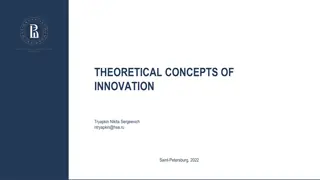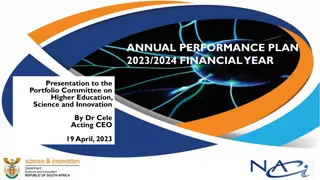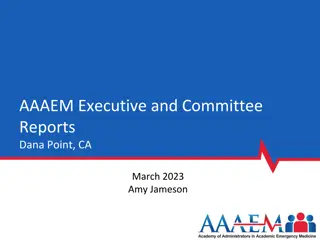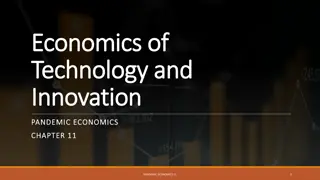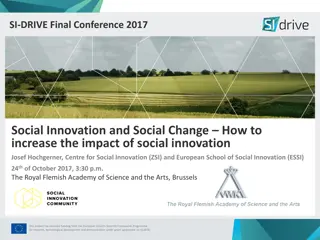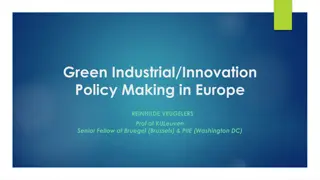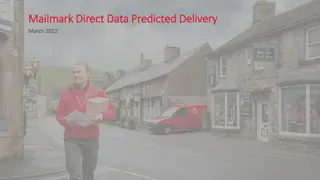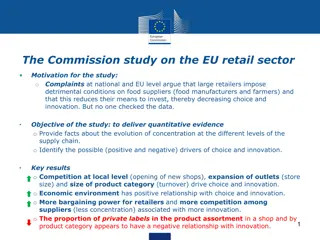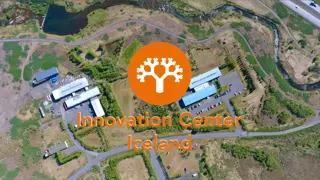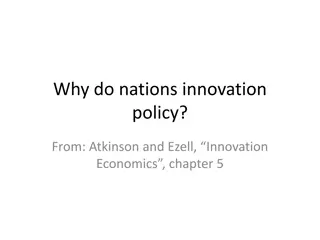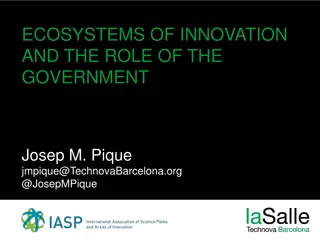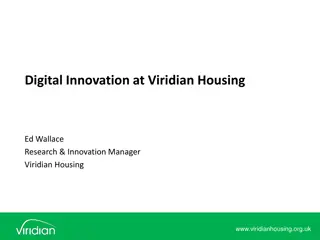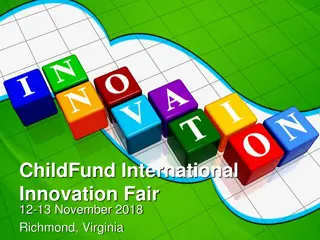SUGI ECIID Expert Committee on Innovation and Impact Delivery
A process focusing on evaluating the impact and innovation delivery in SUGI Projects funded under Horizon 2020. The ECIID Expert Committee aims to enhance the Bfgo Reporting System to scale innovative strategies for broader societal benefits in sustainable urban food-water-energy systems.
Uploaded on Feb 22, 2025 | 1 Views
Download Presentation

Please find below an Image/Link to download the presentation.
The content on the website is provided AS IS for your information and personal use only. It may not be sold, licensed, or shared on other websites without obtaining consent from the author.If you encounter any issues during the download, it is possible that the publisher has removed the file from their server.
You are allowed to download the files provided on this website for personal or commercial use, subject to the condition that they are used lawfully. All files are the property of their respective owners.
The content on the website is provided AS IS for your information and personal use only. It may not be sold, licensed, or shared on other websites without obtaining consent from the author.
E N D
Presentation Transcript
This project has received funding from the European Unions Horizon 2020 research and innovation programme under grant agreement No 730254 SUGI ECIID Expert Committee on Innovation and Impact Delivery A process toward assessing the Return on Investment in the SUGI Projects by the the SUGI Program Consortium of Funders
Innovation Innovation is the creation, development and implementation of a new product, process or service, with the aim of improving efficiency, effectiveness or competitive advantage. Innovation is the successful exploitation of new ideas. It is the process of translating an idea or invention into a good or service that creates value or for which stakeholders will pay. Innovation often results when ideas are applied in projects in order to further satisfy the needs and expectations of the boader community of stakeholders. Innovation is often also viewed as the application of better solutions that meet new requirements, unarticulated needs, or existing needs. Source: Dictionaries; WIkipedia
Impact Impact refers to the potential for a research project to benefit society or advance desired societal outcomes. Projects, in the aggregate, should contribute more broadly to achieving societal goals S C A L I N G These Broader Impacts may be accomplished through the research itself, through activities that are directly related to specific research projects, or through activities that are directly supported by, but are complementary to, the project. Meaningful assessment and evaluation of projects should be based on appropriate metrics, keeping in mind the likely correlation between the effect of broader impacts and the resources provided to implement projects. If the size of the activity is limited, evaluation of that activity in isolation is not likely to be meaningful. Thus, assessing the effectiveness of these activities may best be done at a higher, more aggregated level than the individual project. Source: https://www.nsf.gov/od/oia/publications/Broader_Impacts.pdf
Hence, ECIID focus is on assessing the Return on Investment in the SUGI Projects by the the SUGI Program Consortium of Funders ECIID approach to this include: Development of an indicators and assessment of innovation and impact delivery toolkit to evaluate information provided in Annual Reports submitted by the SUGI Projects Proposing enhancements of the Bfgo Reporting System to encourage SUGI Projects to consider how innovative strategies and accrued knowledge/tools/models and consortia might be scaled in order to attain broader aggregated impact in terms of benefits to society in terms of sustainable food-water-energy systems in urban context. Interacting with SUGI Projects and SUGI Program Implementation Group Submitting annual reports of ECIID assessment to the SUGI Program Consortium of Funders
Caveats ECIID was formally established in Januay 2020; i.e., more than a year after the SUGI Projects began implementation. Hence, the SUGI projects could not effectively provide information in Year 1 Annual Reports directly pertinent to the metrics of indicators. and Our analyses of Year 1 project reports is somewhat subjective; measurable impacts not yet possible. We hope to secure more useful information in reports of following years
ECIID Metrics Toolkit Improvement? recommendation?? Indicator/Metric? FOOD:? Supply? of? food? Economic?Impact? Access? to? food? Engagement?of? Stakeholders/applicants? within?the?project? (Activities? of? beneficiaries)? Environmental?Impact? ?? Food? quality? Societal?Impact? Food:? Feeding? practices? Use?of?innovative?formats? in?project?for?real?life? testing? (Activities? of? beneficiaries)? ? SDGs ?? Diversity? of? diet? Food? preparation? Type?of?innovation? envisaged?in?the?project? (? Activities? of? beneficiaries)? Project?has?successfully? reached?its?objectives? (Tangible? project? outputs/outcomes)? ?? Water? abstraction? Food? loss? ?? Waste? water? treatment? Food? consumption? by? households? ? ? Publications?in?the?area? of?sustainable? urbanisation?based?on?JPI? UE?project?findings? (Tangible? project? outputs/outcomes)? Water:? Quality? of? freshwater? sources? ? Food ?? Drinking-water? quality? Energy? dependency? Patents?in?the?area?of? sustainable?urbanisation? based?on?JPI?UE?project? findings? (Tangible? project? outputs/outcomes)? ?? Energy? consumption? and? efficiency? Energy:? Combined? heat? and? power? Water:? Sanitation? Number?of?involved? Master?&?PhD?students? (? Tangible? project? outputs/outcomes)? Water? use? by? households? ?? Water? Consumption? of? renewables? Energy:? ? Consumption? of? biofuels? Number?and?type?of?living? labs?and?other?tested? outputs? (Tangible? project? outputs/outcomes)? ? ?? ? ? Water Energy
Likely will delete this slide An example . Publications in the area of sustainable urbanisatio n based on JPI UE project findings unclear Patents in the area of sustainable urbanisatio n based on JPI UE project findings Engagement of stakeholder s/applicants within the project Use of innovative formats in project for real life testing Number and type of living labs and other tested outputs Engagement of stakeholder s/applicants within the project Use of innovative formats in project for real life testing Type of innovation envisaged in the project Number of involved Master & PhD students Project has successfully reached its objectives Mosly academic institutions collaborating with two national NGOs, one private sector organization, and a number of stakeholder organizations. However, stakholder organization engagement seems not direct, but rather indirect through website abnd Engagement with very local scale urban farms in several countries wth widely varying conditions where sustainable food production/lo cal consumption might be enhanced Phyto remediation of lead contaminated garden soils and micro anerobic digester technologies aimed at circular economy considerations to be experimented with in different settings by partners in local food gardens. too early. none none 2 post- doctoral and graduate students directly involved. noe as yet Conference presentations, one journal paper, web based articles.
An example. Likely will delete this slide Cooperation with Other Projects and Programmes including the global south Environmental Impact Notes and Comments Economic Impact Societal Impact no unclear. (Aside note that other SUGI projects wish to collaborate and share information on small scale urban farming). unclear unclear Potential exists because community gardens are engaged. 51 pages of tabulated detailes of partners, personnel, irrelavant budget pages, before information on engagement of students and informative material on progress! Overall, this is a hands on on ground effort at small scales in partner sities involving a few select garden plots and communities. Unclear what broader impact this effort might lead to.
What did we learn from metrics toolkit exercise? 1. Include key metric elements in Bfgo Reporting System for future reports 2. Besides distilling narratives for each metric element, attempt to quantify metric element information 3. If possible consider use of trend arrows and/or traffic lights to indicate progress in indicators with time
What did we learn from metrics toolkit exercise? (continued)? 4. It is possible to group projects in to several categories such as: (i) Projects developing tools, models, Apps, etc. (ii) Projects focusing on a component (food-water-energy) and including green economy challenges (iii) Projects include circular economy considerations .etc. 5. Hence, ECIID must engage with the projects on ongoing basis to understand and distill information on innovations and broader impacts with respect to these categories
What to expect in Working Group sessions to follow this update? Discuss 1: In what form is the innovation / knowledge generated through the project usable and scalable depending upon context? Discuss 2: How will your projects measure societal or economic, or ecosystem benefits? Under what conditions would this impact be achieved? Discuss 3: What is the current extent and prospect of sustained engagement of stakeholders in individual programs? How might these interactions be enhanced going forward? Discuss 4: Who are the intended users of the knowledge generated? Stakeholders directly engaged in research or also those stakeholdersw that might benefit if knowledge, tools, models, etc. were broad;y available and scalable>
Thank you for your attention. Please post questions or need for clarification on ECIID effort
Monitoring and Assessment of Innovation and Impact Delivery of Projects: Work Package description Funding Agencies Objectives: 1. Facilitate conditions and opportunities for stakeholder engagement in terms of generating a collaborative environment 2. Create and operationalise the programme approach focused on EN- SUGI innovative results, 3. Enhance the exchange and liaison in research and innovation, and exchange of resulting knowledge/innovation, between European and global communities and markets. Grant Agreemen t/ MOU Responsabilities of the ECIID : 1. indicators and assessment of innovation and impact delivery toolkit development 2. delivering annual and final assessment reports on innovation and impact delivery based on received project reports with recommendations for further improvements 3. delivering annual and final summary report on assessing the programme approach to EN-SUGI on delivery of innovation and impact. TOR ECIID
